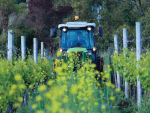Felton Road produces two distinctly different single vineyard Pinot Noirs from two relatively close Bannockburn vineyards, both farmed biodynamically. Ziyu Li, from Lincoln University’s Department of Wine, Food and Molecular Biosciences, has been exploring the distinctive sensory profiles of these wines, along with their chemical differences, by considering the individual sites, rootstocks, soils and rhizosphere microbes. In this Q&A, Ziyu takes us from land to lab to explain her work.
What intrigues you about this research?
According to a report conducted in 2013 by Dr Roland Harrison, there are significant differences in soil properties between the two vineyards of Felton Road, named Calvert and Cornish Point. These two vineyard sites are about 5km apart and are characterised by having similar growing conditions and viticulture management. We believe differences in soil profiles could be a strong driving factor that influences the soil microbial diversity and consequent grape and wine chemical composition.
Please explain the work to date.
During the 2023 vintage, we collected samples from both vineyards, including soil samples and berry samples from the same clone but different rootstocks. Laboratoryscale winemaking was then conducted to investigate the consequent impact on the resultant Pinot Noir wine composition. A range of analysis, including soil physical and chemical properties, rhizosphere microbial diversity, and grape and wine composition, were conducted.
What's most challenging about this research?
We have included a very large amount of samples over two vintages in this project, and thus a large amount of data will be collected. Appropriate statistical analysis of the data will be the most challenging part in this study, in order to find out the potential relationships between soil, microbes and grape and wine composition.
What drew you to Lincoln University and wine science?
During my master’s study at Northwest Agriculture & Forest University in China, I not only acquired fundamental knowledge in grape cultivation and winemaking but also gained an initial exposure to the wine industry. In October 2017, I attended a workshop delivered by Drs Harrison, Charles Brennan, and Bin Tian when they visited my university. They introduced me to the New Zealand wine industry and a range of current research projects conducted at Lincoln University, and I developed a great interest in studying at Lincoln University and exploring more of the New Zealand wine industry.
Who has helped you with this PhD?
During the research process, I received valuable assistance from many people. With their help, I was able to smoothly carry out sample collection and various experiments. My supervisor Dr Bin Tian patiently demonstrated the experiments and guided me through each research stage. The associate supervisors, Drs. Leandro Dias Araujo, Olaf Schelezki, and Romy Moukarzel, actively engaged in discussions with me, providing significant input into experimental design. The staff at Lincoln University were willing to train me thoroughly in the induction and experimental equipment. Staff at Felton Road, especially Blair Walter (advisor of my project) and Larissa Woods, also provided excellent assistance in the experimental plan and collection of the grape samples.
What's next for you Ziyu?
Completing this project on time with the aim to provide valuable new information for the wine industry through a better understanding of the interactions among the soil properties, rhizosphere microbes, and grape and wine chemistry. Following this, I intend to get an academic position at university, and pursue further studies in this field, in order to have deeper understanding of complex interaction between environmental factors and grapevines.














